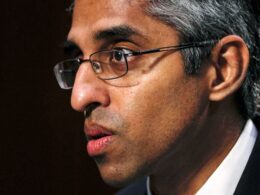MIT SMR Strategy Forum
September 30, 2021
The COVID-19 pandemic has had sweeping effects on the way we work, manage, and live our lives.
Since early 2020, people have gone from daily commutes to working in their pajamas, entire industries have been upended through government lockdowns, stores have struggled to meet customer demand in a logjammed global supply chain, and millions of people have left their jobs.
The changes have been swift, but are they permanent?
For many, including those who have transitioned into hybrid or remote office environments or changed career paths entirely, the answer might be yes.
But even if the pandemic has brought many lasting changes to working life, has it permanently changed how companies should think about business strategy?
This was the question we asked our panel of strategy experts from across the globe to weigh in on this month in our 2021 relaunch of the MIT SMR Strategy Forum.
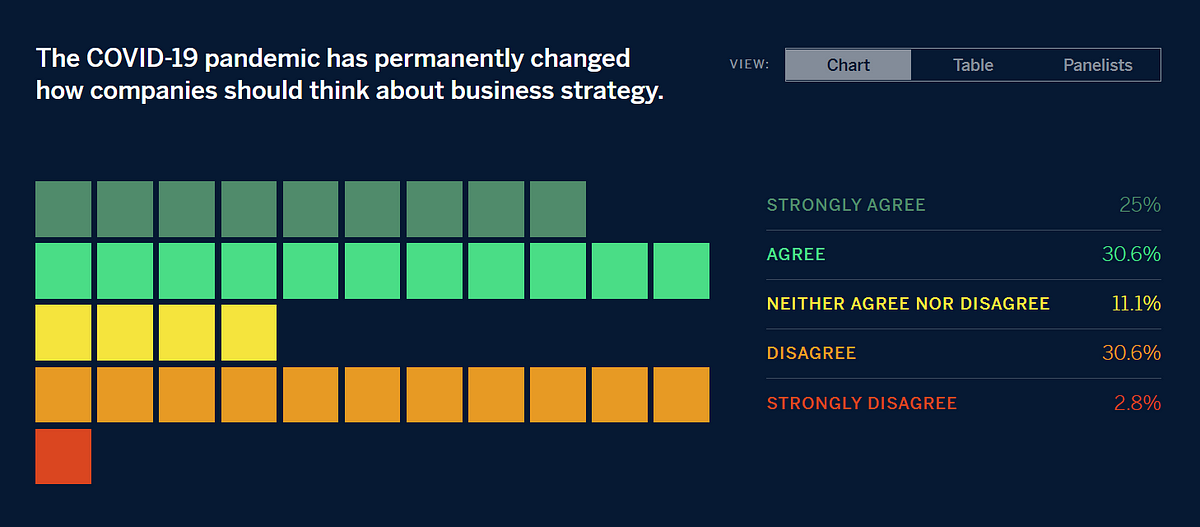
For those who agree that COVID has permanently reshaped strategy, two leading drivers emerge as themes:
- flexible work and
- supply chain resilience.
As Melissa Schilling, professor at NYU Stern writes, “The response to the pandemic has shown us that we can (and should) be more flexible in thinking about how, where, and when we work together.”
Likewise, Erik Brynjolfsson of Stanford University notes that many of the major changes in work arrangements are likely to have lasting effects, including “the use of digital technologies, the geography of work, and the nature of interactions.”
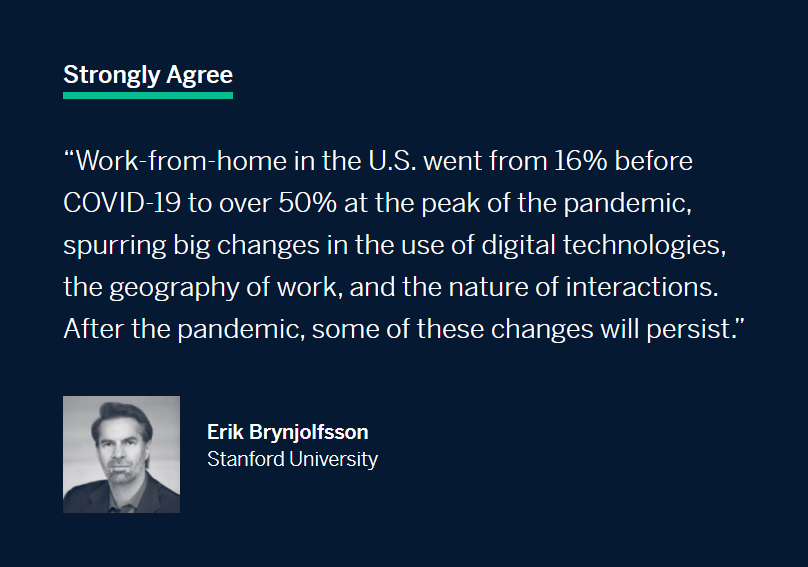
On the supply chain side, many panelists point to the fragility of the supply chain and the lack of robust response and resilience throughout many industries and organizations as an indication that permanent lasting changes to strategy must be underway.
As Ivan Png notes, previous natural disasters have been effective case studies in how particular industries and geographies can be affected by crisis, but “by contrast, the COVID-19 pandemic cut off supplies across all industries. All businesses (not only manufacturers) must rethink their just-in-time strategies.”
Olenka Kacperczyk of London Business School says that to gain resilience in uncertain environments, “both strategic and operational agility will gain greater ground across many firms and many industries, even those traditionally operating in less volatile conditions.”
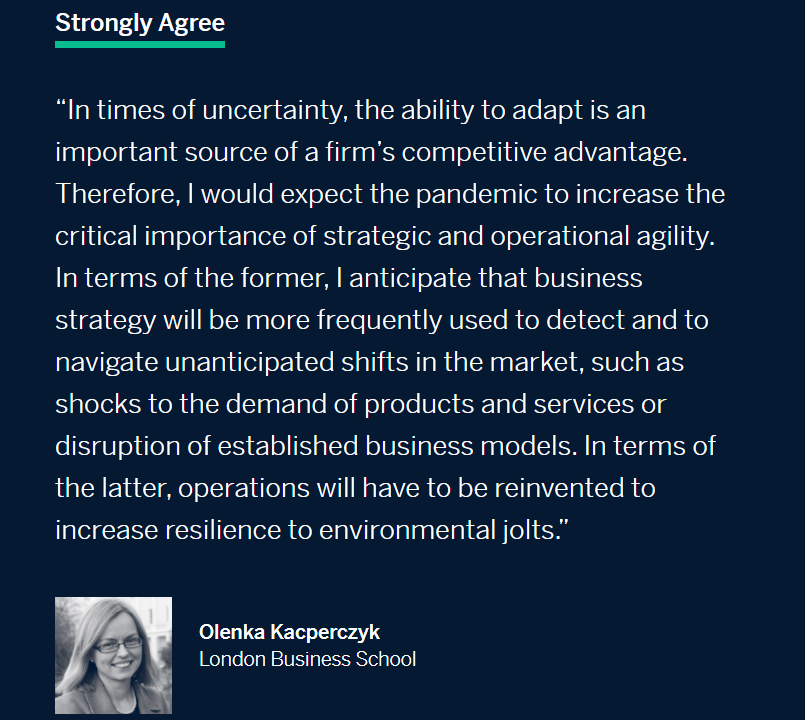
Those who disagree that COVID-19 has permanently changed business strategy (making up 31% of responses) point to the fact that despite disruptions and some permanent changes for workers and businesses, the fundamentals of strategy remain consistent for organizations.
As Bruno Cassiman, professor at IESE Business School, puts it: “The principle of creating value and developing a competitive advantage to capture part of this value has not changed.”
Lori Rosenkopf of Wharton agrees, noting that while the content of strategy has likely changed, “it’s the role of a great strategist to be anticipating a wide variety of outcomes and building contingency plans.”
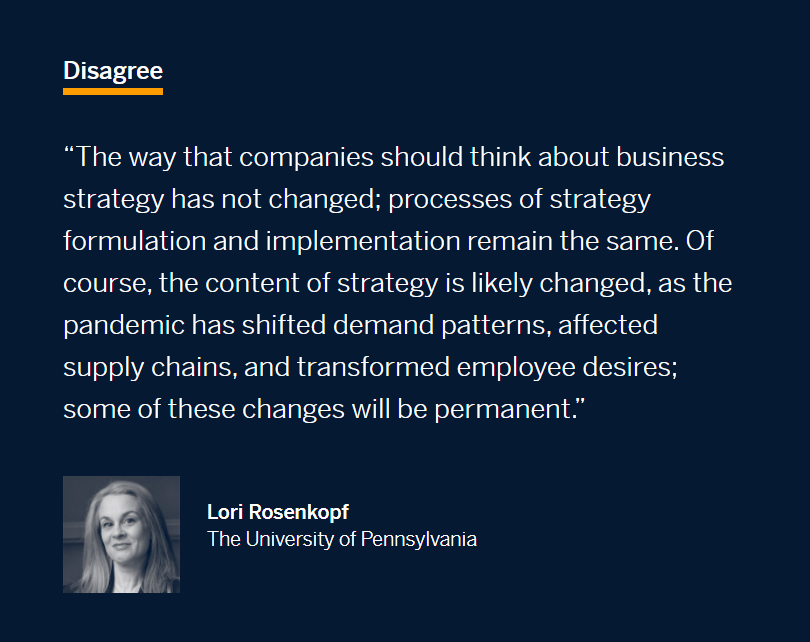
… while the content of strategy has likely changed, “it’s the role of a great strategist to be anticipating a wide variety of outcomes and building contingency plans.”
Caroline Flammer of Boston University disagrees that the pandemic has permanently affected business strategy (yet) — but points out that it should.
As she writes, “the current pandemic is one among several other system-level crises that the (business) world is facing. Others include climate change, social injustice, and poverty, to name a few.”
… the current pandemic is one among several other system-level crises that the (business) world is facing. Others include climate change, social injustice, and poverty, to name a few.
Flammer argues that in order for businesses to remain competitive and address grand challenges, companies need to start making more permanent shifts in thinking and “adopt a system-level approach in their business strategy.”
A common thread through responses, across the spectrum of agreement, is that the forced experimentation of COVID has brought many necessary shifts in business thinking.
As panelist Joshua Gans concludes, “The takeaway should be that businesses were doing too little experimentation before.”
“The takeaway should be that businesses were doing too little experimentation before.”
Whether the pandemic has fundamentally shifted the practice of strategy, all companies and leaders must be thinking proactively about how to sense and respond to future disruption and answer to the pressing societal challenges the crisis has highlighted.
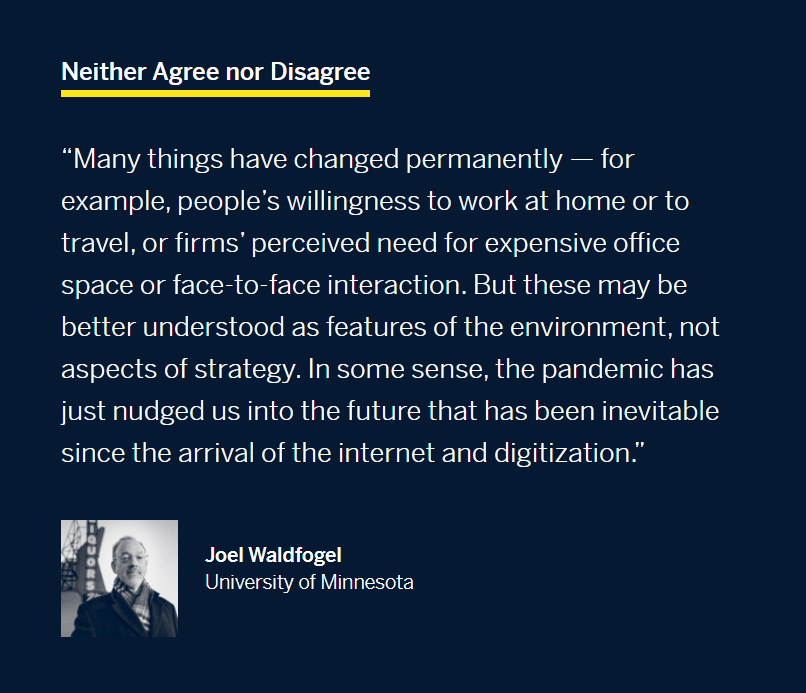
Whether the pandemic has fundamentally shifted the practice of strategy, all companies and leaders must be thinking proactively about how to sense and respond to future disruption and answer to the pressing societal challenges the crisis has highlighted.
About the MIT SMR Strategy Forum
Each month, the MIT SMR Strategy Forum poses a single question to our panel of experts in the fields of business, economics, and management. Panelists are asked to agree or disagree with a prediction and provide a brief explanation for their response.
This page allows readers to engage with the results of each survey. You can see the share of panelists who agree or disagree with each prediction, how confident they feel about their answers, and the thinking behind their responses. To explore individual panelists’ thought processes about each question, click through to their voting history page. Readers can also submit their own suggestions for future topics to smr-strategy@mit.edu.
Forum Chairs
Raffaella Sadun (@raffasadun) is a professor of business administration in the Strategy Unit at Harvard Business School. Professor Sadun’s research focuses on the economics of productivity, management, and organizational change.
Timothy Simcoe is an associate professor of strategy and innovation at Boston University’s Questrom School of Business.
Annamaria Conti is an associate professor of strategy at the University of Lausanne’s Faculty of Business and Economics and serves as co-editor of the Journal of Economics & Management Strategy.
Names cited
Melissa Schilling, professor at NYU Stern;
Erik Brynjolfsson of Stanford University;
Ivan Png
Olenka Kacperczyk, of London Business School;
Bruno Cassiman, professor at IESE Business School;
Lori Rosenkopf, of Wharton;
Caroline Flammer,
Joshua Gans
About the MIT SMR Strategy Forum
Each month, the MIT SMR Strategy Forum poses a single question to our panel of experts in the fields of business, economics, and management. Panelists are asked to agree or disagree with a prediction and provide a brief explanation for their response.
This page allows readers to engage with the results of each survey. You can see the share of panelists who agree or disagree with each prediction, how confident they feel about their answers, and the thinking behind their responses. To explore individual panelists’ thought processes about each question, click through to their voting history page. Readers can also submit their own suggestions for future topics to smr-strategy@mit.edu.
Originally published at https://sloanreview.mit.edu on September 30, 2021.








